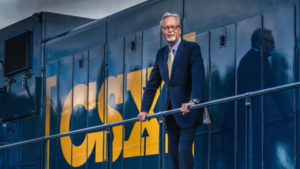Controversial BNSF rail hub will get $35 million from State of Kansas
Written by jroodVeiled by the Kansas debate over cutting state services or raising taxes was a $35-million gem that lawmakers left for BNSF, The Kansas City Star reports. As the Legislature passed a sales tax increase to avoid deep spending cuts, it also cut a deal that will allow BNSF to start work this year on a controversial Johnson County freight hub that has been delayed by the recession.
The
project is "a critical part of Kansas’ new transportation plan, which will
invest billions of dollars in the Kansas economy over the next 10 years while
putting tens of thousands of our fellow Kansans back to work," Gov. Mark
Parkinson, a Democrat, said in a statement.
The
railroad gets the money in exchange for agreeing to start the project this
year, officials said.
BNSF
officials could not be reached for comment, but state officials said the
company had signaled that the project will move ahead.
The
incentive will come from state sales taxes paid on utilities serving the entire
1,000-acre project, which includes the nearly 500-acre freight yard plus a
warehousing complex being developed separately. State officials note that the
freight yard and warehouses will pay taxes that they could have potentially
avoided in the long run.
"The
reality is we’re getting them to agree to pay those (taxes) when they probably
would have been granted an exemption," said Joe Erskine, a deputy state
transportation secretary.
State
and local officials had hoped to secure $50 million in stimulus money for BNSF
but lost out in February, when the federal government doled out $1.5 billion.
The
state incentive was in the tax plan and the transportation bill that the
Legislature approved as its session ended.
The
project has been in the works since at least 2005, when the idea first surfaced
of building the rail hub in the Gardner area. The property, about 30 miles
southwest of Kansas City, is now part of Edgerton. At one point, BNSF had
considered starting construction in 2007, but getting a required federal
environmental permit took much longer than expected. The company said last year
that it was indefinitely delaying the project because of the recession and
shrinking freight volumes.
One
local economic development expert was optimistic about the project’s future.
"My
hope is with this incentive that was created by the Kansas Legislature, we may
see this project move ahead sooner than it otherwise would have," said Bob
Marcusse, the president of the Kansas City Area Development Council.
The
proposed rail hub would be one of the area’s biggest development projects, with
the potential of pouring hundreds of millions of dollars into the local economy
and creating thousands of jobs.
BNSF
said it needs a new freight center because of increasing demand and space
limitations at its yard in the Argentine district of Kansas City, Kan.
Some
people who live near the site of the proposed hub have argued vehemently
against the project, saying it poses environmental risks for their community
and the entire Kansas City area. A national environmental group has gone to
court, trying to force BNSF to conduct a more extensive review of the project’s
potential effect on the environment.
Eric
Kirkendall, who once lived near Gardner, has fought the project for several
years. Now a Lawrence resident, Kirkendall blasted the plan Monday.
"This
was stealth legislation to help the richest man in America, Warren Buffett, his
BNSF railroad company, and their developers," he said.
"The
warehousing and trucking this mega-facility generates will impose traffic
congestion, diesel exhaust pollution and illnesses on the citizens of Johnson
County. This is a lose-lose proposition for all Kansans."
The
Natural Resources Defense Council and several residents have asked a judge to
block the permit issued for the rail yard by the Army Corps of Engineers, which
concluded that the project would not significantly affect the environment.
The
plaintiffs claim that the Corps of Engineers failed to adequately evaluate the
environmental effects. Their lawsuit contends that the hub, along with a
warehouse complex next door, would generate substantial air pollution.
Kansas
Sen. Karin Brownlee, an Olathe Republican, did not support the tax bill that
contained the incentive, but the money "does jump-start a very important
project that’s going to be a true economic boost in the region," she said.
Kansas
Rep. Mike Kiegerl, also an Olathe Republican, voted against the tax bill. While
Kiegerl said he thought the rail project would be positive for the community,
he opposed giving any financial incentive to a wealthy company like BNSF.
"I
do not believe in corporate welfare," Kiegerl said, adding: "This is a very
profitable corporation. Thirty-five million is a drop in the bucket for them. I
know they would like to have it. I would like to have more money. Everybody
would."





